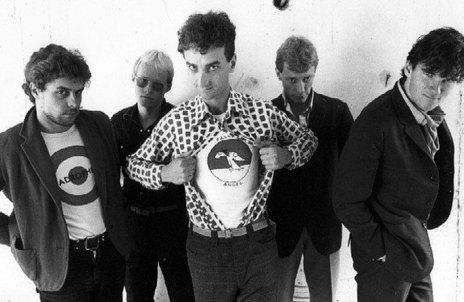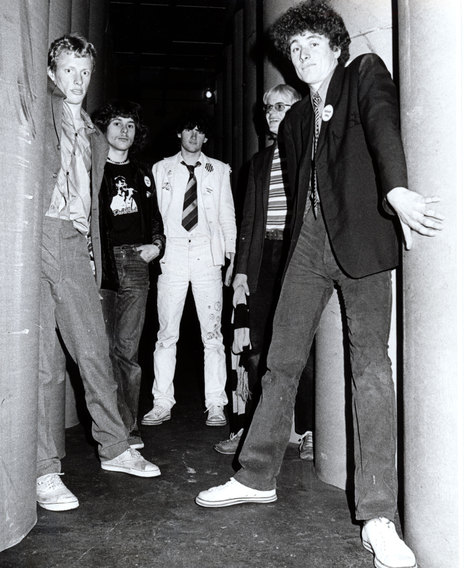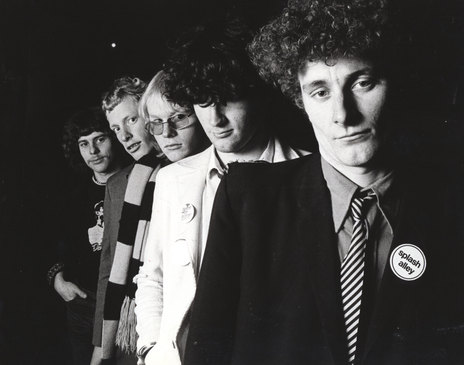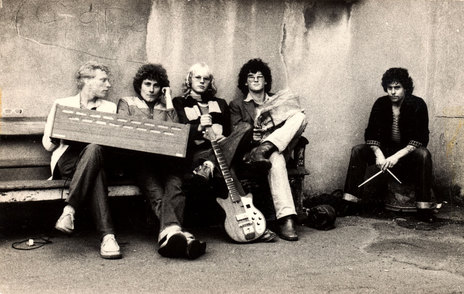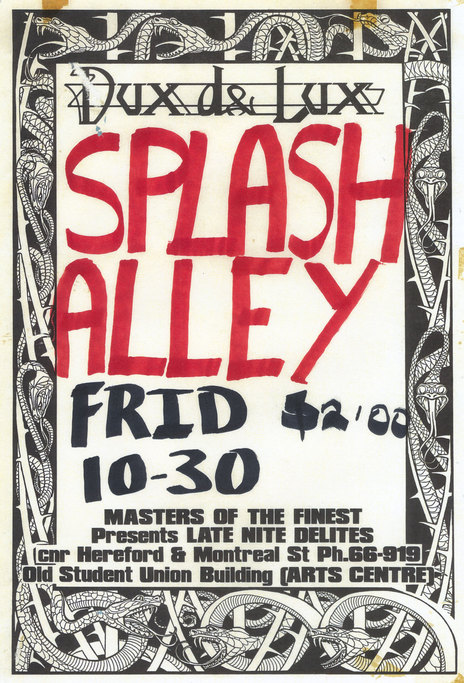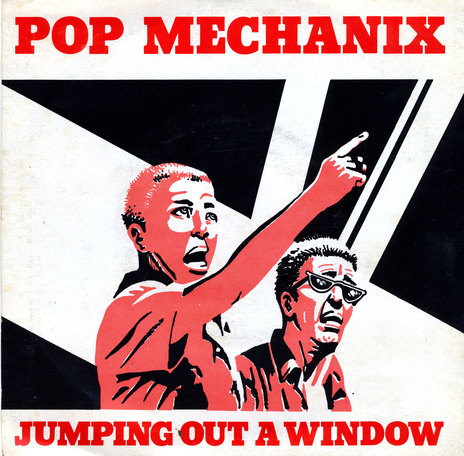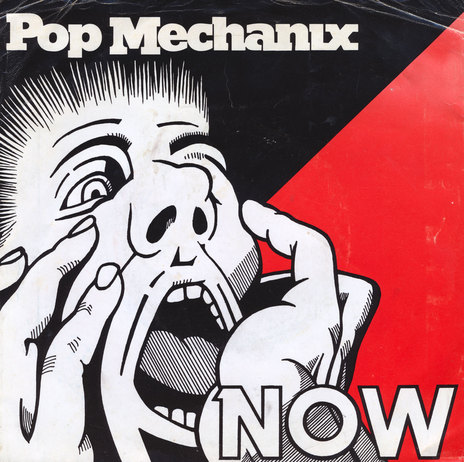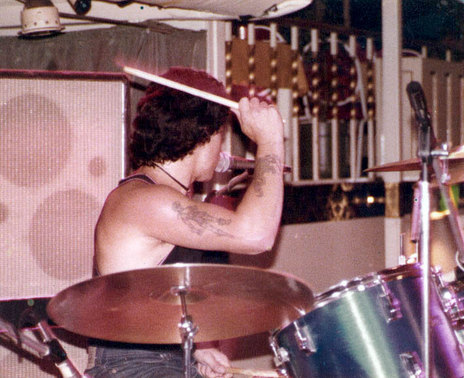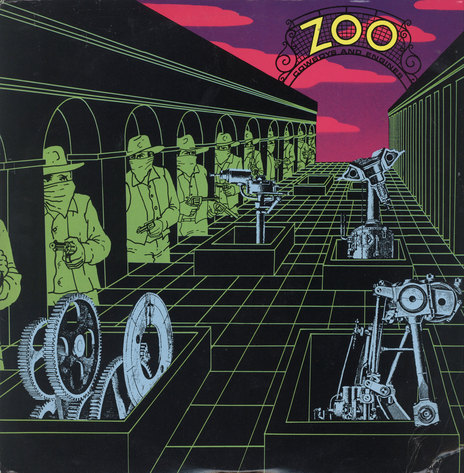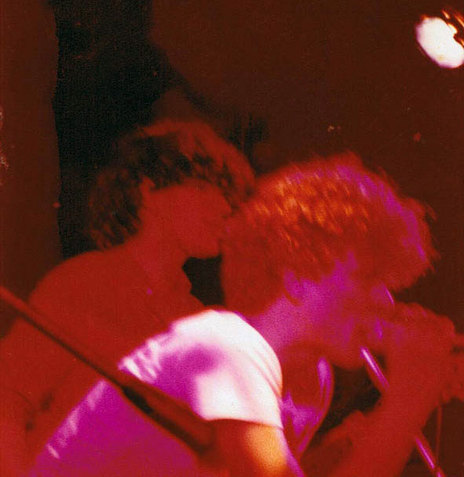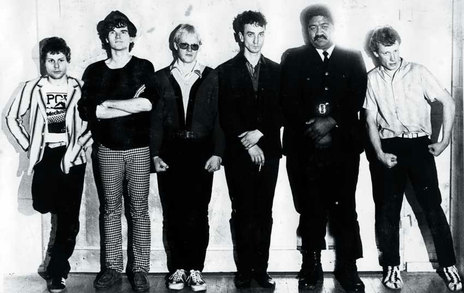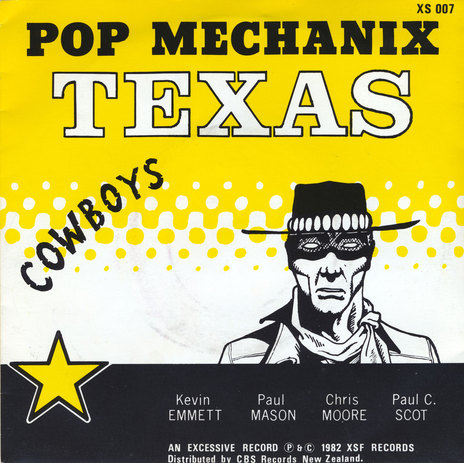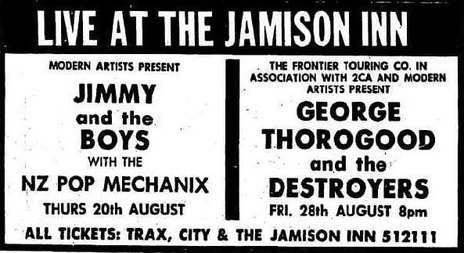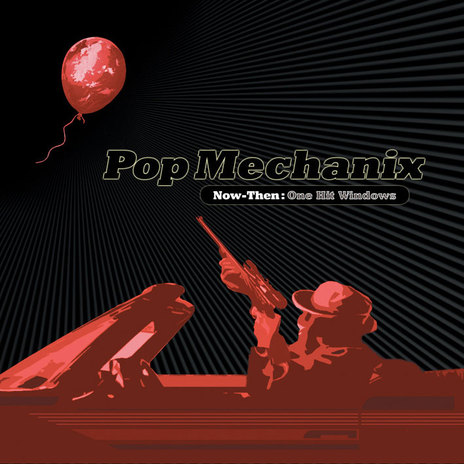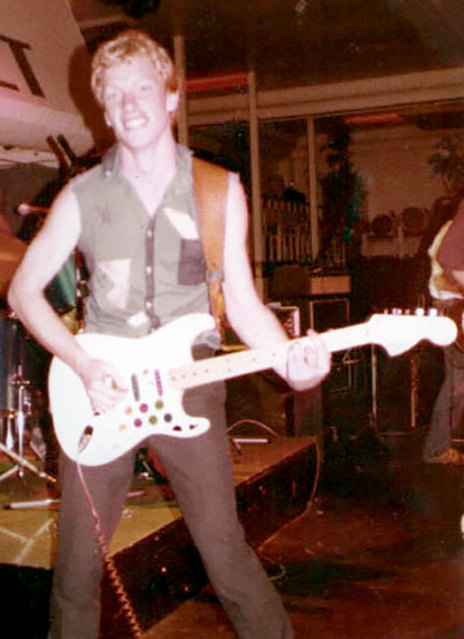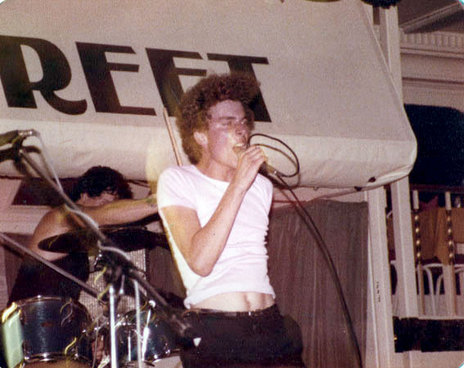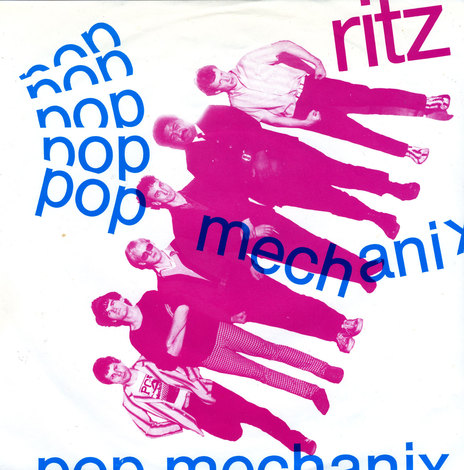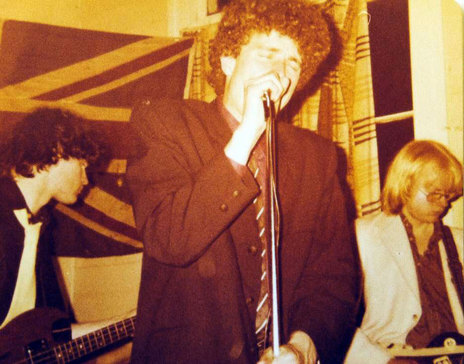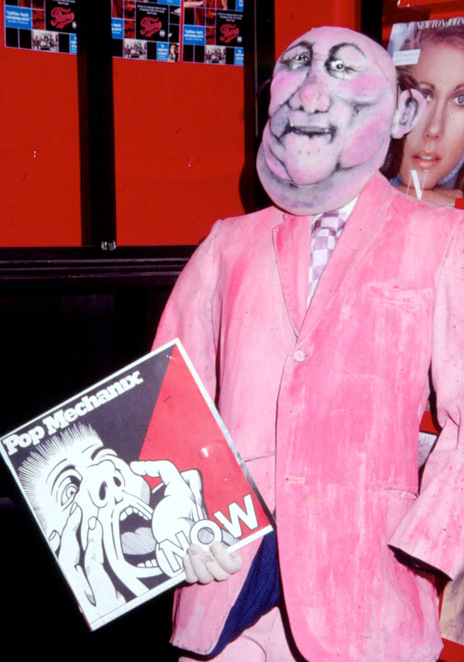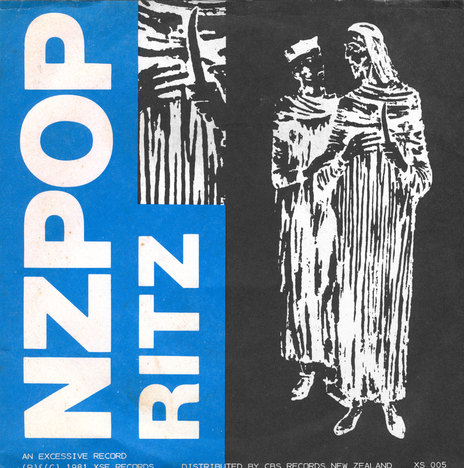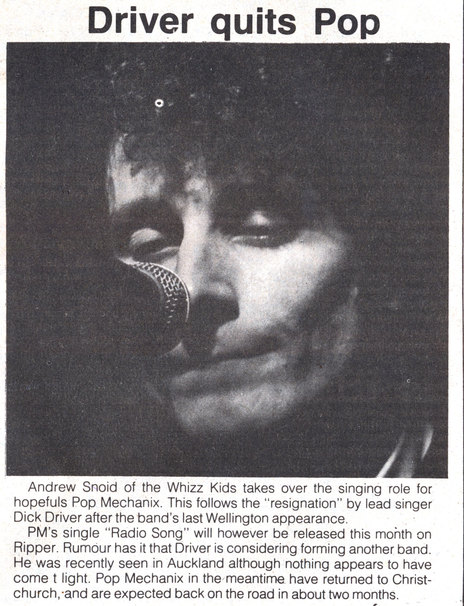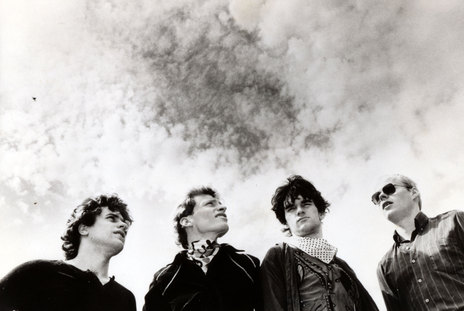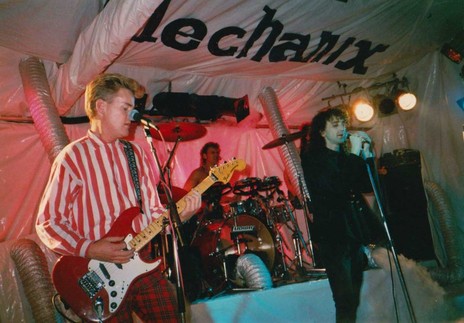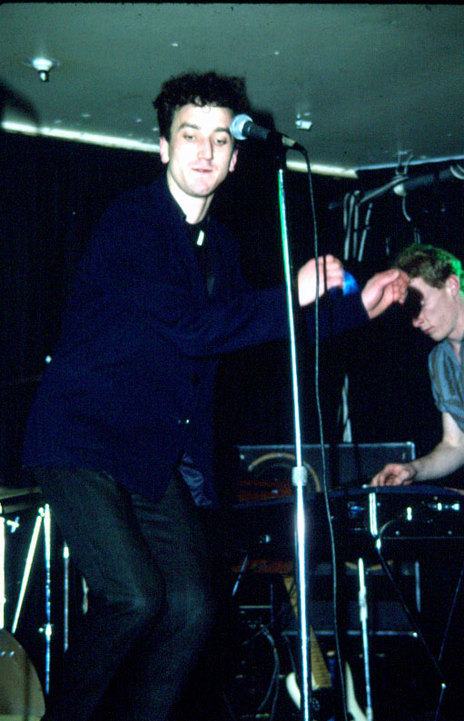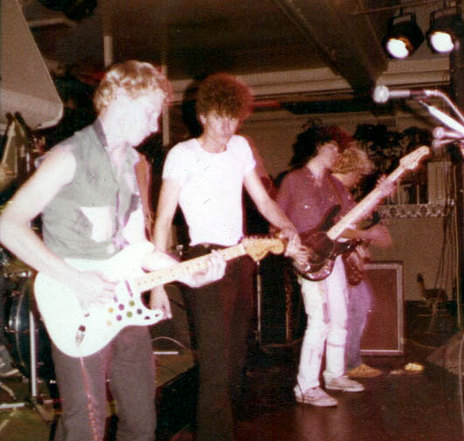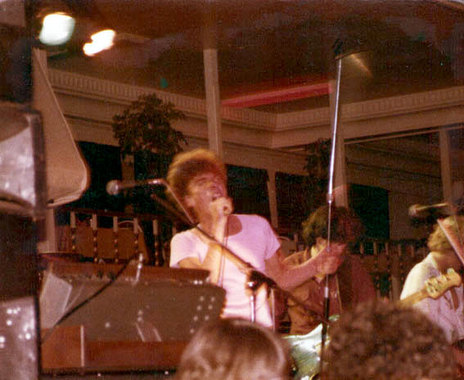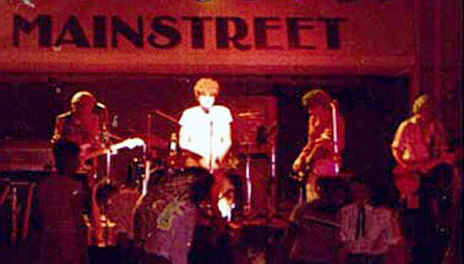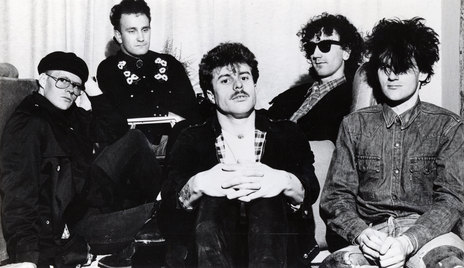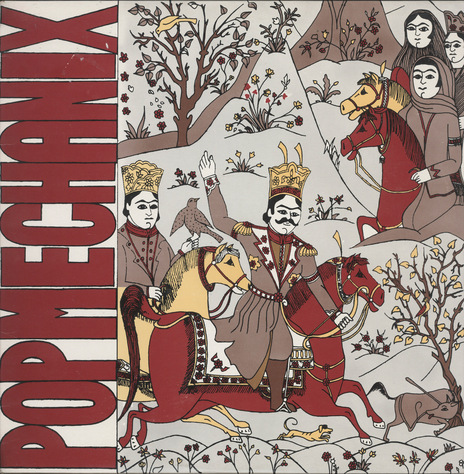Paul Scott came up with an idea and a name in early 1979. The idea was to form a group with Chris Moore, a guitarist he met on an earlier trip to Christchurch. Moore was friends with Paul Mason, a guitarist, while another friend, Kevin Emmett, played drums. Guitars, drums, and Paul on bass? It sounded like a band.
Moore, Emmett and Mason had earlier responded to an ad in Christchurch's CJ’s Music Shop, placed by a female vocalist from Australia. She had a vision for a band called Eve and the Apples. After the rehearsal they had decided the Eve and the Apples concept was not them, but agreed to keep in touch. Moore made himself known to Scott, at a university party, by standing on his glasses. The second rehearsal was just the four of them, Emmett, Moore, Scott, and Mason.
The chemistry was there from the beginning. While musical tastes in the new group were diverse, they had Elvis Costello, Talking Heads, The Sex Pistols and Lou Reed in common. For the group’s name, Scott recycled his old Timaru College band’s handle, Splash Alley.
Splash Alley found a singer in Richard (Dick) Driver, a tall, wild-haired motorcycle racer, late of long-haired punks The Doomed.
Splash Alley found a singer in Richard (Dick) Driver, a tall, wild-haired motorcycle racer, late of long-haired punks The Doomed. Driver looked the part and had been on TV and in the papers. In turn, he recognised in Paul Scott, who was self-effacing and humble, the determination and focus needed for a successful group. Scott was constantly thinking about and listening to music and coming up with words and sounds.
Splash Alley played covers initially; their set cribbed by Scott from Christchurch pub rockers Vapour and the Trails at the DB Gladstone, where Al Park’s boys had a near residency in the first half of 1979. In the main it was high-octane rock and roll and smart sharp pop. Lou Reed’s ‘Rock & Roll’, Talking Heads’ ‘Psycho Killer’, Elvis Costello’s ‘Pump It Up’, Tom Petty and the Heartbreakers’ ‘Listen To Her Heart’ and ‘Need To Know’, The Modern Lovers’ ‘Roadrunner’ and The Banana Splits theme.
From the original Splash Alley came the storming white trash rocker ‘Brains Are Dumb’. Another early Scott band, Dawn Patrol, provided ‘Radio Song’. There was Scott and Moore’s slow building burner, ‘White Girl’, and a chunky riffer, ‘Spanish’. Future hit ‘Now’ and ‘Skinny Girls’ followed.
The public got their first look and listen at the Dux de Lux on the old University of Canterbury campus and they liked what they heard. When The Swingers swung through Christchurch in late August for attendance record-breaking shows at the Hillsborough, Splash Alley opened, returning the following week with Vapour and the Trails.
Mid-month September they were in morning daily The Press, where a striking photograph caught them in “a mood of menace and mystery.” The writer found the group in good humour, describing their sound as commercial power pop, second wave and energy rock and roll, and talking about a move to Australia. They’d been together three and a half months.
More was to come. In October they supported art rockers Bon Marche, who were resident group at The Aranui, a large popular bar in the city’s eastern suburbs. The Aranui was an institution in Christchurch that ran music five nights a week and on Saturday afternoons. There was always a good crowd of regulars.
Supporting the Marc Hunter-less Dragon at the Christchurch Town Hall, they prompted more coverage in The Press under the headline "Street Fighting Men" coupled with another sharp snap of the group, with Dick in front wearing a narrow striped tie and op-shop suit jacket burst out at one shoulder and Paul Scott partly hidden under a long black fringe. It is a classic new wave shot.
When Bon Marche vacated The Aranui to promote their cover of Phil Judd’s ‘So This Is Love?’ Splash Alley moved in for seven weeks, starting in early October 1979. The experience was valuable as they honed their set and stage skills.
Splash Alley was radio station 3ZM’s group of the month for October. Their prize was a chance to record four songs: ‘Commercial Airways’, ‘Skinny Girls’, ‘Texas’ and ‘Too Cool For Words’.
With Christchurch tamed and successful out of city shows in Ashburton and Dunedin, the north was calling. The fast accelerating live scene in Auckland and the big North Island provincial city pubs, that was the magical road to Oz.
Dick Driver organised the Hillcrest Tavern in Hamilton and The Cabana in Napier, adding the Albert in Palmerston North, DB Ngamotu in New Plymouth, Auckland's Potter’s Wheel and The Station to DB Waitemata and Whakatane’s Tainui Tavern.
They called it the Into The Eighties tour and headed north in early December, away from the whole weird scene that had unfolded with Dick’s workmate – the undercover cop who’d become a Splash Alley roadie. He’d hook up at after show parties in Dunedin and Christchurch, buy a little and see who was selling and using. Then he disappeared and people up and down the South Island were busted. A Christchurch music promoter and motorcycle dealer was convicted for importing heroin in motorcycle frames.
Splash Alley didn’t use heavy drugs, so Dick Driver wondered why he was chosen to unknowingly help the undercover enter the scene. It had to be the combination of music and motorcycles. Dick Driver, a keen motorcycle racer, had a foot in both worlds.
In the early 1980s, Hamilton’s Tavern Hillcrest, a student pub on the city’s eastern edge five minutes walk from the University of Waikato campus, was the main venue for touring groups. Inside, the crowd was quiet until Splash Alley hit the line in their upbeat rocker, ‘Spanish’: “Everybody’s got a conscience, even in New Zealand.” That got them amping, a reaction they’d get repeatedly, playing two, sometimes three 45 minute sets in the provincial centres. They’d stay in the pub’s band house, practise and write new songs in the morning in the bar, and win over the locals in the evening.
Auckland proved harder to crack. The scene was polarised and clique bound and already serviced by a confident, diverse and popular set of groups when Splash Alley played their first shows in January 1980, at the Potter’s Wheel in New Lynn and the Station Hotel.
Back in Christchurch in February, the band was renamed Pop Mechanix.
Back in Christchurch in February, the band was renamed Pop Mechanix. They capitalised on their growing reputation, selling out the Hillsborough Tavern with popular trio The Vauxhalls in support. An early March Timewarp Dance at Canterbury University student orientation saw them in guitar smashing mode, trashing cheap op-shop guitars on stage.
It was soon clear they’d outgrown the South Island and in mid-April after shows at the Gladstone (with Vapour and the Trails, Vacuum, The Androidss and The Vauxhalls) and the Hillsborough, they hit the road, literally, their trailer uncoupling on the way back into Christchurch and smashing into a shop window.
Pop Mechanix found a replacement and headed north on their Practical Wireless tour to Willy’s Wine Bar and The Last Resort in Wellington. There they hit full stride as a live band, leaping up a gear before the eyes and ears of Mike Chunn, former Split Enz and Citizen Band bassist, who signed on as manager and offered them a release on Auckland indie Ripper Records.
Outside the Cabana in Napier, the trailer was written off again, this time by a drunk driver. Pop Mechanix hired a second van and started for Hamilton – a long, tricky journey during which they blew a tyre at high speed. The van rolled and skidded along on its side as band members piled atop one another and their gear spilled out along the road.
They hired another van and arrived at the Hillcrest with one light and half a PA, where they filled the room. Next they travelled on to Auckland’s Windsor Castle, Mainstreet, the New Station Hotel, the Potter’s Wheel and the newly opened XS Cafe. Their reception in the city was enthusiastic, except for punk stronghold the Windsor Castle, where they found the audience’s punker-than-thou attitude snobbish and off-putting.
The group saw their former roadie in the audience at the Potter’s Wheel. They called him by the name they knew. He said it wasn’t his name and expressed regret that the group had been caught up in the undercover vice operation. He knew none of the band members were heavy drug users.
Sleeping on the floor at XS Cafe and in cheap rooms opposite Mainstreet Cabaret, Pop Mechanix picked up a mod following, inspired by the brilliant, era-evoking movie Quadrophenia, based on The Who’s concept album.
A quick-witted Sunday News reporter pulled the group and their Vespa riding mod followers together for a preview showing and a story. Although, Pop Mechanix weren’t consciously a mod group, their sound had neat lines, pop and power.
For their first single, Pop Mechanix chose the upbeat wordy pop of ‘Now’.
For their first single, Pop Mechanix chose the upbeat wordy pop of ‘Now’. It was a classic debut, confident, clever and crafted with a strong internal dynamic.
On the road again in June, Pop Mechanix headed south on another tour in the build-up to Australia. Another step, except for Driver it was a step too far. His girlfriend was pregnant in Christchurch and he was under family pressure to return home. Torn, he quit the band in Wellington.
Mike Chunn suggested Andrew McLennan as his replacement. His group, The Whizz Kids, played Pop Mechanix’s first XS Cafe show and he’d been impressed by Pop Mechanix’s songs and style.
The new line-up stepped out for the first time in August at Mainstreet. Fans couldn’t help but be startled by the physical similarity between Driver and McLennan. Both were tall and lanky with big hair and sharp craggy faces. The difference was in their voices. Driver’s was stronger while McLennan was more tuneful. As a performer Driver was more dramatic whereas McLennan was a musician who could contribute to the sound.
Next up were shows with Manchester’s Magazine, formed by Howard Devoto after his early departure from The Buzzcocks.
RipItUp Xtra’s Mark Phillips caught up with Pop Mechanix at the Rumba Bar on Victoria Street West, where they broke the door record in front of a crowd of “boots, mods, punks, (and) trendies.” He’d earlier thought them, “tight, meaty and highly danceable.”
In October ‘Now’ crept to No.48 on the national singles chart. Auckland's two most clued-in stations, Radio Hauraki and 1ZM, began playing the track. Three thousand more sets of ears got to hear it in November 1980 when Pop Mechanix supported The Motels, who were in the country on the back of their hit ‘Total Control’.
It was the first time in a big concert venue for Pop Mechanix. By then, they had a set stacked with gems: amped up garage rockers such as ‘Spanish’, ‘Brains Are Dumb’ and ‘Cliché’, which poked fun at punks over a stomping punk riff. ‘Disguises’ and ‘Post Office Towers’ had the observational mod pop feel of The Jam. Ska left its mark on ‘Ritz’, a loping, harmony-heavy skank.
‘Holidays’ was the more musically successful dark side. ‘White Girl’, an early Moore and Scott collaboration, ate the air with an insistent stalking lead line that The Saints would have been proud of. There’s also more than a little snarling Stooges menace in Paul Mason’s guitar as the track builds around Scott’s biting lyric.
When ‘Ritz’, backed with ‘Talking’ and ‘Brains Are Dumb’, was released as a one-off single on RCA Records (licensed from Mike Chunn, who was no longer with Ripper) in December it settled at No.50 for a single week. An underage venue tour followed with The Crocodiles, old guard rockers making a spirited return with ‘Tears’, but that was only a limited success, the lull before the storm.
Pop Mechanix cut it up at Sweetwaters in January 1981, where CBS Records Australia signed them for an album and Split Enz offered the support slot on their upcoming tour of Australia. In New Zealand they were released on Mike Chunn's new XSF label, via CBS.
Before they left New Zealand, Pop Mechanix recorded their lasting claim to New Zealand fame, ‘Jumping Out A Window’.
Before they left New Zealand, Pop Mechanix recorded their lasting claim to New Zealand fame, ‘Jumping Out A Window’, with Split Enz keyboard player, Eddie Rayner producing at Mandrill Studios in late January, 1981. ‘Jumping Out A Window’ was eventually released in Australia and Great Britain.
After one last New Zealand tour, Pop Mechanix made the hop across the Tasman in March 1981, leaving behind a top 30 single and a glowing showing in the RipItUp Readers Poll for 1980. They were third favourite New Zealand group behind Split Enz and Toy Love. ‘Ritz’ was number two New Zealand single behind Toy Love’s ‘Don’t Ask Me’. Andrew Snoid was second equal New Zealand vocalist with Tim Finn, behind Chris Knox. Paul Scott made number four on the bassist list.
Pop Mechanix hit the ground running in Australia with Split Enz supports and a warm-up spot before Joe Cocker in Sydney. Stuart Coupe of Sydney Morning Herald, who liked their Sweetwaters performance, wrote up the recently arrived group. ‘Jumping Out A Window’, their new calling card, got good exposure on the popular Melbourne based TV chart show, Countdown.
They’d only just begun to pick up a following when a Canberra group with a similar name, Popular Mechanics, took umbrage at the New Zealand group’s name and took them to court. It was a battle that Pop Mechanix lost, leaving them only two small Australian territories where they could be Pop Mechanix. A change to NZ Pop Mechanix then to NZPop (the name they used performing a new version of ‘The Ritz’ on Countdown) and finally Zoo, followed. By then, singer Andrew McLennan had left to join The Swingers.
It was as Zoo that they released Cowboys and Engines, a fine album that produced two classy singles in ‘Keep It Up’ and ‘Private Military’ in 1982. Neither of which charted in New Zealand or Australia despite a triumphant return to Sweetwaters in February earlier that year and dogged touring.
They’d supported Madness, had shows in Noumea and were stepping out three to four times a week in Central Sydney, North Shore and Eastern Suburbs drawing on a set of over seventy songs.
In 1983, Pop Mechanix returned to New Zealand after notable outings such as opening Narara ’83 at Somersby in NSW on Australia Day weekend.
There was an attempt to resurrect the group under their original name in the mid-1980s with Brent Williams replacing Chris Moore. Two new singles, ‘Looking Through The Eyes Of Love’ in 1985 and ‘Celebration of the Skin’ in 1986, together with a 1985 EP (combining the first record with two extra tracks ‘Virginia Purple’ and ‘No Surprise’), followed on Auckland indie Hit Singles. The band also played extensively around both the North and South Islands.
Surprising given their long absence, ‘Celebration of The Skin’ climbed to No.25 in the pop chart in June 1986.
Perhaps driven by this gigging but a little surprising given their long absence, ‘Celebration of The Skin’ climbed to No.25 in the pop chart in June 1986 but disappeared in subsequent weeks. Many years later a TV show publicly revealed the chart rigging attempt by their manager that found the single banned from future charts. Their manager had attempted to buy singles from a store in Wellington and the cheque - from WEA Records – had bounced. The embarrassed band knew nothing of this and the initial chart placing was based on genuine sales.
Two old Auckland hands, Mark Bell and Peter Warren, replaced Emmett and Williams for the 1988 minor chart hit, ‘Pale Sun’, before the group called it a day.
In April 2005, Christchurch indie label Failsafe Records dug deep into the band’s extensive catalogue of live and studio recordings for seven historical CD releases. Now collected up singles and demos from 1979 to 1981, Zoo had their Australian efforts from 1981 to 1983, while three more records collected the work of the mid-1980s Pop Mechanix line-ups. A compilation of the group’s hits, Now: Then (One Hit Windows) followed in 2010 as did a Splash Alley collection. All up it was one of the most comprehensive revisits given to any New Zealand group, let alone one that had slipped from memory.
